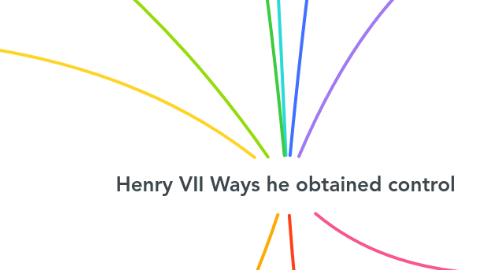
1. Acts of Attainder
1.1. Punishment or Rewards : Land and title taken away
1.1.1. Led to social and economic ruin for any family
1.2. 1486 - Thomas Howard, Earl of Surrey's lands were attained after fighting for Richard III at Bosworth and imprisoned
1.2.1. Released after taking an oath of allegaince and reversal of attainder began, finished in 1492, return of estates
1.3. 138 Numbers of attainders passed, 46 Numbers of attainders reversed
1.3.1. 9 attainders passed agaisnt nobles, 5 reversed, 4 of reversals had special features attached
1.3.2. Harsh terms imposed on men of less than noble rank
1.3.2.1. Payment for reversal was common : Thomas Tyrell paid £1,738 for removal of him and his father's attainder
1.3.3. 1485-87 : 56 passed (due to take control of England)
1.3.4. 1495 : 24 passed (due to Warbeck and accomplices)
1.3.5. 1504-1509 : 51 passed (due to paranoia)
2. Patronage
2.1. The giving of positions of power, titles, land to remain secure and win over nobles
2.1.1. Result of good and loyal service instead of buying loyalty, he rewarded loyalty
2.2. Loyal support at and before battle of Bosworth
2.2.1. Earl of Oxford, John de Vere became a major landowner in East Anglia
2.2.2. Jasper Tudor, made Duke of Bedford, restored Welsh estates, rewarded with extra land
2.2.3. Thomas Lord Stanley, Earl of Derby retained control of Lancashire and Chesire
2.2.4. Robert, Lord Wiloughby de Broke, received many rewards
2.3. Good service
2.3.1. George Talbot, Earl of Shrewsbury, closest councillors
2.3.2. Edmund Dudley, lawyer, right-hand man, use title of King's councillor as proudly
2.3.3. Sir Reginald Bray, helped to accumulate land over 18 countries, worth over £1,000 per annum
3. Bonds and Recognisances
3.1. Written agreement, people promise to pay if they failed to carry promises
3.1.1. Formal acknowledgement of debt or obligation
3.1.2. Centered around good behaviour and keeping peace towards subjects
3.2. 1485 - 1905 : 36/62 families gaves bonds or/and recognisances
3.3. 1492 - Thoma Grey, Marquis of Dorset, required to transfer all land except two manors to trustees, give recognisances of £1,000 and find another £10,000. Agreement cancelled in order, he hadto prove loyalty to Henry by 1494
4. Great Council/Privy Conucil
4.1. Meetings of noblemen to discuss high state matters, emergencies when Parliament were taking too long
4.1.1. Way of gaining agreement and support
4.2. Five meeting
4.2.1. 1485 : calling for Parliament, announcement of Henry'smarriage
4.2.2. 1487 : Lambert Simnel's threat response
4.2.3. 1488 : authorise subsidy for campaign in Brittany
4.2.4. 1491 : authorise war with France
4.2.5. 1496 : grant loan of £120,000 for war in Scotland
5. King's Council and Privy Council
5.1. Position as king's councillor, King's confidence of person in th eposition, loyalty and trusted servants
5.2. John Morton (1486 to 1500) + William Warham (1504 to 1509)
5.3. 5 key councillors alligned before Bosworth: Reginald Bray, Giles Daubeney, Richard Guildford, Thomas Lovell, John Riselly
5.4. Treasurer - Lord Dinham (1486 to 1501) then Earl of Surrey (1501-1522)
6. Order of the Garter
6.1. Honour reserved for King's closest servants
6.2. Created 37 Knights of the Garter, over half were closest associates in war and government
6.2.1. Reginald Bray, Earl of Oxford
6.3. Gave the recipent prestige/reputation but not power or land
7. Retaining
7.1. Limits power, may lead to danger of rebellion as nobility and lords recruited those of a lower social status as their followers
7.2. 1485
7.2.1. Lords and Common had to swear to parliament they would not retain illegally
7.2.2. Proclamations ensured that nobles had to obtain special 'placards' or licenses to retain by the King in person
7.3. 1504 (financial ruin threat)
7.3.1. 1504 Act had penalty of £5 per month per illegal retainer
7.3.1.1. 1506 - Lord Burgavenny fine of £70,550 but scaled down and divided by 26 others
7.3.2. 1494 - Earl of Devon, gave recognisance not to retain illegally, broke promise in 1506, forced to pay part of the sum due
8. Crown lands
8.1. 5x larger than Henry VI's
8.2. Lands formerly hekd by Warwick, Duke of Clarence and Gloucester retained by Henry
8.3. 1486 - Parliament passed Act of Resumption, recovered for all the Crown all properties granted away since 1455
8.4. Henry rewarded loyal supporters with lands from forfeitef land of opponents, not from Crown lands
9. Feudal Dues
9.1. He sent numerous commissions of inquiry to re-establish his rights
9.1.1. Wardship : King took control og estates of minors (too young to be held responsible for inheritance), until they became of age. King would take profits fom their estates
9.1.1.1. Edward, Duke of Buckingham, fined £7,000 for entering inheritance in 1498 without license before age 21
9.1.1.2. Increased proceeds from £350 in 1487 to £6,000 in 1507
9.1.2. Livery : King was paid in order for someone to recover land from wardship
9.1.3. Marriage : King made profit from arranged marriages of heirs and heiresses
9.1.3.1. Katherine, Dowager of Buckingham, fined £7,000 in 1496 for marrying without King's license
9.1.4. Relief : King received money as land was inherited, form of inheritance tax
9.1.5. Escheats : payments made when land reverted to the Crown
